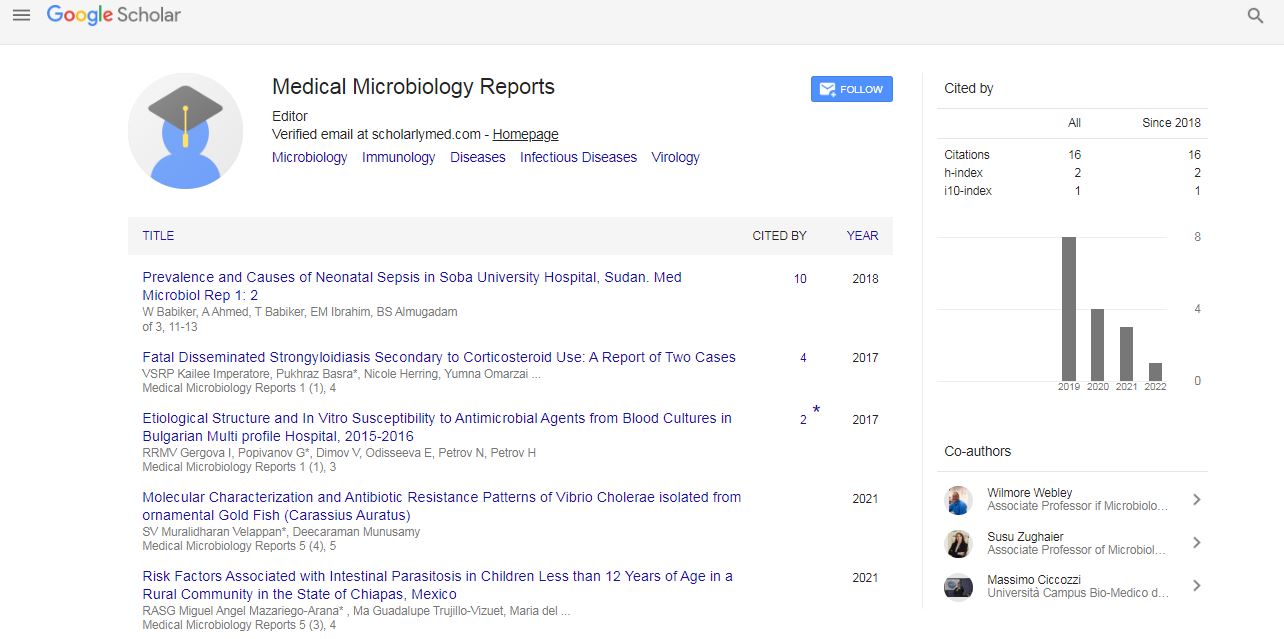Opinion Article, Med Microbiol Rep Vol: 7 Issue: 4
Dissecting Infectious Disease Enigmas Globally
Guang Xinbin*
1Department of Infectious Diseases, Jichi Medical University Hospital, Tochigi, Japan
*Corresponding Author: Guang Xinbin,
Department of Infectious Diseases, Jichi Medical University Hospital, Tochigi,
Japan
E-mail: guanxin@jichi.ac.jp
Received date: 24 November, 2023, Manuscript No. MMR-24-128551;
Editor assigned date: 27 November, 2023, PreQC No. MMR-24-128551 (PQ);
Reviewed date: 11 December, 2023, QC No. MMR-24-128551;
Revised date: 18 December, 2023, Manuscript No. MMR-24-128551 (R);
Published date: 26 December, 2023, DOI: 10.4172/MMR.1000358
Citation: Xinbin G (2023) Dissecting Infectious Disease Enigmas Globally. Med Microbiol Rep 7:4.
Description
The study of infectious diseases remains as a complex and an important endeavor. These microscopic adversaries pose persistent challenges to human well-being, requiring a comprehensive and meticulous approach to understand the enigmas they present. Dissecting infectious disease enigmas globally involves negotiating a multifaceted terrain that encompasses the complex interaction of pathogens, host responses, environmental factors and societal dynamics. Viruses, bacteria, fungi and parasites are the primary culprits behind infectious diseases, displaying remarkable diversity in the structures, genetic composition and modes of transmission. Dissecting these enigmas requires a deep exploration into the molecular and cellular mechanisms that govern the interactions between pathogens and their hosts. Analysts explore the nuances of viral entry, bacterial replication and parasitic life cycles, aiming to decipher the complex embrace that determines the outcome of infection. The global dimension of infectious diseases introduces an additional layer of complexity. Consequently, the dynamics of infectious diseases are shaped by factors such as population movement, climate change and globalization.
A comprehensive approach to dissecting these enigmas necessitates a global perspective, recognizing the interconnectedness of communities and the shared vulnerabilities to emerging threats. Epidemics and pandemics, with their potential for widespread devastation, highlight the urgency of understanding and addressing infectious diseases on a global scale. The continuing COVID-19 pandemic serves as a stark reminder of the interconnected nature of the world and the need for swift, coordinated responses to emerging threats. Dissecting infectious disease enigmas involves not only understanding all the nuances of individual pathogens but also developing strategies to mitigate the impact of pandemics on a global scale. In dissecting these enigmas, the role of technology and innovation cannot be overstated. Diagnostic tools, ranging from traditional microbiological methods to advanced molecular techniques, enable rapid and accurate identification of infectious agents.
Substantial sequencing and bioinformatics contribute to the surveillance and tracking of pathogens, aiding in the understanding of their evolution and spread. Moreover, technological advancements in vaccine development and antiviral therapies have the potential to transform the ability to prevent and treat infectious diseases. The enigma of antimicrobial resistance adds a layer of urgency to the study of infectious diseases. The overuse and misuse of antibiotics have led to the emergence of drug-resistant strains of bacteria and other pathogens. Unraveling this enigma requires a multifaceted approach that includes understanding the genetic basis of resistance, promoting responsible antibiotic use and developing novel therapeutic strategies. Societal factors play a vital role in the dynamics of infectious diseases by adding another layer to the enigma. Cultural practices, socioeconomic disparities and healthcare infrastructure profoundly influence the prevalence and impact of infectious diseases in different regions.
Conclusion
Dissecting these societal enigmas involves not only understanding the biological aspects of pathogens but also addressing the social determinants that contribute to the vulnerability of communities to infectious disease outbreaks. In dissecting infectious disease enigmas globally, the field of public health appears as the foundation. Surveillance, prevention and intervention strategies are paramount in controlling the spread of infectious diseases. Education and communication play vital roles in empowering communities to adopt preventive measures and fostering a global culture of preparedness. The integration of public health measures with innovative analysis forms a symbiotic relationship, as scientific discoveries inform public health policies and practices. The dissecting infectious disease enigma globally is a multifaceted and dynamic undertaking.
 Spanish
Spanish  Chinese
Chinese  Russian
Russian  German
German  French
French  Japanese
Japanese  Portuguese
Portuguese  Hindi
Hindi 
